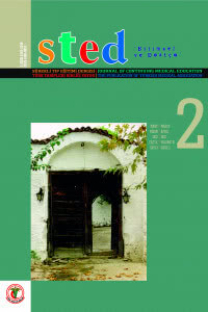Üniversite öğrencilerinin cinsel sağlık konusundaki bilgi düzeyleri ve davranışları
Knowledge and behaviour of University students related to sexual health
___
- 1. World Health Organization. Sexual and reproductive health. [Internet] http://www.who.int/reproductivehealth/topics/ adolescence/en/ Erişim: 20.03.2014
- 2. Türkiye İstatistik Kurumu [Internet] http://www.tuik.gov.tr/PreTablo.do?alt_id=1027 Erişim: 18.03.2014
- 3. Uygun S. Üniversite Gençliğinin Yabancılaşması. Bilim ve Aklın Aydınlığında Eğitim Dergisi 2004; 57: 231-6.
- 4. Pektaş İ, Bilge A. Ege Üniversitesi İzmir Atatürk Sağlık Yüksekokulu öğrencilerinin problem alanlarının belirlenmesi. İnönü Üniversitesi Eğitim Fakültesi Dergisi 2007; 8(14): 83-98.
- 5. Karabulutlu Ö, Kılıç M. Üniversite öğrencilerinin cinsel sağlık ve üreme sağlığı hakkındaki bilgi düzeylerinin belirlenmesi. Anadolu Hemşirelik ve Sağlık Bilimleri Dergisi 2011; 14 (2): 39-45.
- 6. T.C. Sağlık Bakanlığı Ana Çocuk Sağlığı ve Aile Planlaması Genel Müdürlüğü, Gençlere yönelik üreme sağlığı hizmetleri katılımcı kitabı [Internet] http://www.ghs.gov.tr/birimdosya/Gus.pdf Erişim: 18.03.2014
- 7. Simbar M, Tehrani FR, Hashemi Z. Reproductive health knowledge, attitudes and practices of Iranian college students. Eastern Mediterranean Health Journal, Vol. 11, Nos 5/6, 2005.
- 8. Kaya F, Serin Ö, Genç A. Eğitim Fakültesi Birinci Sınıf Öğrencilerinin Cinsel Yaşamlarına İlişkin Yaklaşımlarının Belirlenmesi. TSK Koruyucu Hekimlik Bülteni 2007; 6(6): 441-8.
- 9. UNICEF, The State of the Worlds Children 2011. http://www.unfpa.org.tr/turkeytr/rapyay/ genclerdecinselsaglik.pdf Erişim: 18.03.2014
- 10. Giray H, Kılıç B. Bekar kadınlar ve üreme sağlığı. Sürekli Tıp Eğitimi Dergisi 2004; 13(8): 286-9.
- 11. Pınar G, Doğan N, Ökdem Ş, Algıer L, Öksüz E. Özel bir üniversitede okuyan öğrencilerin cinsel sağlıkla ilgili bilgi tutum ve davranışları. Tıp Araştırmaları Dergisi 2009; 7 (2):105 -13.
- 12. Dattilo J, Brewer MK. Assessing clients sexual health as a component of holistic nursing practice: Senior nursing students share their experiences. Journal of Holistic Nursing 2005; 23: 208-19.
- 13. Koluaçık S, Güneş G, Pehlivan E. İnönü Üniversitesi öğrencilerinin üreme sağlığı konularında bilgi düzeyleri ve hizmetten beklentileri. İnönü Üniversitesi Tıp Fakültesi Dergisi 2010; 17 (1):7-14.
- 14. Dağ H, Dönmez S, Şirin A, Kavlak O. Akran eğitiminin üniversite öğrencilerinin cinsel sağlık konusundaki bilgi düzeylerine etkisi. Anadolu Hemşirelik ve Sağlık Bilimleri Dergisi 2012; 15(1):10-7.
- 15. Özalp S, Tanır Ilgın H, Karataş A, Ilgın B. Eskişehir Osmangazi Üniversitesi Tıp ve Mühendislik Fakültesi öğrencilerinin cinsel yolla bulaşan hastalıklar ve aile planlaması konusundaki bilgi ve tutumlarının değerlendirilmesi. Düzce Tıp Dergisi 2012;14(3):18-21.
- 16. Kılıç NH, Nurcan EK. Adnan Menderes Üniversitesi Sağlık Yüksekokulu ve Sağlık Hizmetleri Meslek Yüksekokulu öğrencilerinin sigaraya yönelik bilgi, tutum ve davranışları. Sağlık Bilimleri Dergisi 2006; 15(2): 85-90.
- 17. Biri A, Korucuoğlu Ü, Yılmaz E. Adölesan kızların cinsel bilgi gereksinim durumlarının belirlenmesi. TJOD 2007; 4(2):104-7.
- 18. Aras Ş, Orçun E, Özan S, Şemin S. Dokuz Eylül Üniversitesi öğrencilerinin cinsel bilgi, tutum ve davranışları. Sağlık ve Toplum Dergisi 2004;4(1):23-8.
- 19. Şimşek H. Toplumsal cinsiyet eşitsizliğinin kadın üreme sağlığına etkisi: Türkiye örneği. DEÜ Tıp Fakültesi Dergisi 2011; 25(2): 119 - 26.
- 20. Özkan H. Üniversite gençliğinin aile planlaması ve cinsel yolla bulaşan hastalıklardan korunmaya ilişkin yaklaşımları. İ.Ü. Sağlık Bilimleri Enstitüsü, Halk Sağlığı Hemşireliği Anabilim Dalı. Yüksek Lisans Tezi, İstanbul.1994.
- 21. Nalbant H, Bulut A. Gençler ve üreme sağlığı. Aktüel Tıp Dergisi 2001; 6 (1):30-6.
- 22. Kırmızıtoprak E, Şimşek Z. Cinsel yolla bulaşan hastalıklar ve güvenli cinsel yaşam konusunda gençlerin bilgi ve davranışlarına akran eğitiminin etkisi. TAF Preventive Medicine Bulletin 2011;10(4):463-72.
- 23. Karabulutlu Ö, Kılıç M. Üniversite öğrencilerinin cinsel sağlık ve üreme sağlığı hakkındaki bilgi düzeylerinin belirlenmesi. Anadolu Hemşirelik ve Sağlık Bilimleri Dergisi 2011; 14 (2): 39-45.
- 24. Koç Z, Sağlam Z. Ondokuz Mayıs Üniversitesi Samsun Sağlık Yüksekokulu üniversite öğrencilerinin cinsel yolla bulaşan hastalıklar ve aile planlaması ile ilgili bilgi ve görüşlerinin belirlenmesi. Türk HIV/AIDS Dergisi 2006; 9(2): 47-60.
- 25. Öztekin Ö, Özkul H, Toğluk E, Aslan E. Üniversite öğrencilerinin cinsel sağlık konusundaki bilgi düzeyleri. 2. Uluslararası - 9. Ulusal Hemşirelik Kongresi, Kongre Kitabı, 734-736, Antalya, Türkiye, 7-11 Eylül 2003. (Poster Bildiri)
- ISSN: 1300-0853
- Yayın Aralığı: Yılda 6 Sayı
- Başlangıç: 1992
- Yayıncı: TÜRK TABİPLERİ BİRLİĞİ
Hatay hemoglobinopati tanı, kontrol ve eğitim merkezi'nin çalışmalarının kesitsel değerlendirilmesi
İlaç kullanan gebeye yaklaşım: Teratojenite riski ve danışmanlık hizmeti
Üniversite öğrencilerinin toplumsal cinsiyet rolüne yönelik görüşleri
Rukuye AYLAZ, Gülsen GÜNEŞ, Özge UZUN, Süheyla ÜNAL
Gökben YASLI, EBRU TURHAN, MUSTAFA TÖZÜN, Azime AHİ, Sinem DOĞANAY, Yasemin ÜLKEN
Çocuklar ve ergenler aydınlatılmış onam sürecinin neresinde?
Hatice KÜRECİ DEMİR, Nuket BÜKEN ÖRNEK
Çocuklarda cinsel istismara bağlı posttravmatik stres bozukluğu (olgu analizi)
Gülçin BOZKURT, Coşkun YORULMAZ
Üniversite öğrencilerinin cinsel sağlık konusundaki bilgi düzeyleri ve davranışları
Ergül ASLAN, HATİCE ACAR BEKTAŞ, ŞÜKRAN BAŞGÖL, Sevda DEMİR, PINAR IRMAK VURAL
